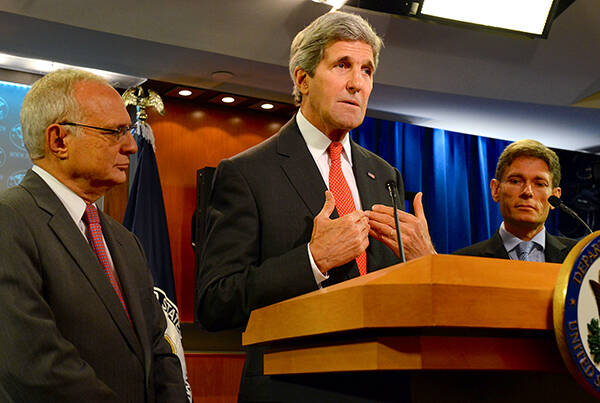And then there were nine. Secretary of State John Kerry announced on July 28 that Turkmenistan has joined the State Department’s list of worst religious freedom offenders.
The State Department’s “Countries of Particular Concern” list had remained static since 2006, when eight countries — Burma, China, Eritrea, Iran, North Korea, Saudi Arabia, Sudan and Uzbekistan — were designated as CPCs.
Justifying the addition of Turkmenistan, Kerry cited reports of people detained, beaten and tortured for their beliefs, prohibited from wearing religious attire and fined for distributing religious materials.
Turkmenistan, a mostly Sunni Muslim country in Central Asia, once part of the Soviet Union, forbids private worship and greatly restricts foreign travel for pilgrimages and religious education.
All religious organizations in the country must register with the government, and Shiite Muslim groups, Protestant groups and Jehovah’s Witnesses have all had their registration applications denied in recent years. Jehovah’s Witnesses, whose beliefs prevent them from fulfilling mandatory military conscription, face particular harassment.
This edition of the State Department’s annual religious freedom report focused heavily on discrimination, impunity and the displacement of religious minorities.
“In 2013, the world witnessed the largest displacement of religious communities in recent memory,” the report said. “In almost every corner of the globe, millions of Christians, Muslims, Hindus, and others representing a range of faiths were forced from their homes on account of their religious beliefs. … Communities are disappearing from their traditional and historic homes and dispersing across the geographic map. In conflict zones, in particular, this mass displacement has become a pernicious norm.”
CPCs were not the only offenders named. Kerry cited anti-Muslim sentiments in Europe and a poll from last year showing that nearly half of the local Jewish populations in some European countries had considered emigrating to escape anti-Semitism.
The report summary also names Syria, Sri Lanka, Egypt, Iraq, Bangladesh, Indonesia, India and Nigeria for failing to protect vulnerable religious communities, which often face violence, discrimination and harassment.
Kerry called the report “a clear-eyed objective look at the state of religious freedom around the world,” adding “it does directly shine a light in a way that makes some countries – even some of our friends – uncomfortable.” He called for the CPC designations to be grounded in real action that can help change reality on the ground.
Although sobering, this year’s report is not without positive developments.
Kerry mentioned Pakistani Muslims who formed human chains to protect Christian worshippers after a church bombing in Peshawar and a Jewish neighborhood watch team that helped Muslim leaders in London ensure safe access to mosques after a series of attacks.
In April, the U.S. Commission on International Religious Freedom, an independent watchdog panel created by Congress to review international religious freedom conditions, recommended that the State Department add Turkmenistan, Egypt, Iraq, Nigeria, Pakistan, Tajikistan, Vietnam and Syria to the list of CPCs.
U.S. Rep. Frank Wolf, a Virginia Republican and one of Congress’s staunchest advocates for a robust U.S. American foreign policy on religious freedom, said that while it makes sense to add Turkmenistan to the list, the report must be backed by a plan to address the persecution described within it.
“My concern about the report is that it doesn’t lay out a strategy on the continued problems in China, in Vietnam,” he said, noting that the Chinese government is still detaining 2010 Nobel laureate and human rights campaigner Liu Xiaobo.
“It’s one thing to say you have a problem,” Wolf said. “It’s another thing to say what as a nation you’re going to do about it.”
USCIRF’s April report also recommended that the vacant post of ambassador-at-large for international religious freedom be filled quickly after Suzan Johnson Cook left that role in October.
Hours before Kerry’s press conference on Monday, President Obama announced plans to tap Rabbi David Saperstein as the next ambassador-at-large for international religious freedom. Saperstein stood by Kerry’s side as the report’s key findings were discussed but refrained from speaking or answering questions from the audience.








